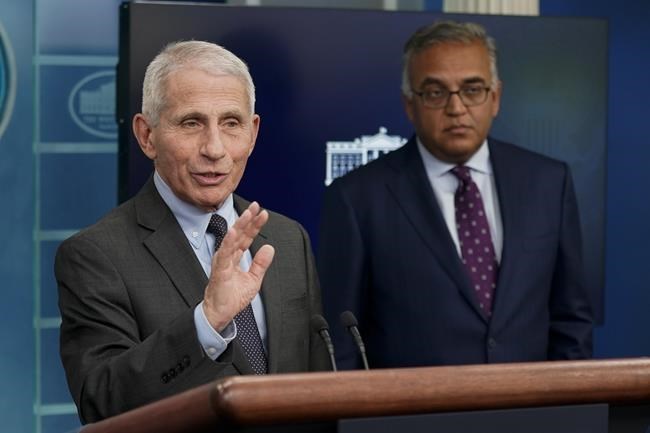Americans who got the updated COVID-19 booster shots are better protected against symptomatic infection than those who haven’t — at least for now, U.S. health officials said Tuesday.
Updated boosters rolled out by Pfizer and rival Moderna in September have been a hard sell for vaccine-weary Americans. Only about 13% of U.S. adults so far have gotten a “bivalent” shot that targets the omicron strain and the original coronavirus. On Tuesday, White House officials announced a renewed push for more Americans to get the latest shots.
The first look at the new shots' real-world effectiveness shows they work, said Dr. Anthony Fauci, the nation's top infectious disease expert.
Speaking at a White House briefing expected to be his last before he retires from the government at the end of year, Fauci said what “may be the final message I give you from this podium is that please, for your own safety, for that of your family, get your updated COVID-19 shot as soon as you're eligible."
The Centers for Disease Control and Prevention analyzed about 360,000 COVID-19 tests given to people with coronavirus-like symptoms at drugstores around the country between September, when the new boosters rolled out, and early November. Researchers compared the vaccination status of those who wound up having COVID-19 with those who didn’t.
The new omicron-targeting booster added 30% to 56% protection against symptomatic infection, depending on how many prior vaccinations someone had, how long ago and their age, the CDC concluded.
People getting the greatest benefit are those who'd never had a prior booster, just two doses of the original COVID-19 vaccine at least eight months earlier, said CDC's Dr. Ruth Link-Gelles, who led the study.
But even people who got a summertime booster of the original vaccine before seeking the new fall formula were 30% to 40% more protected than if they’d skipped this latest shot, she said.
“We think about it as the additional benefit or incremental benefit of getting one more dose, and in this case that one more dose is a bivalent,” Link-Gelles said.
The updated boosters target the BA.5 omicron strain that until recently was the most common type, an effort to build on the original COVID-19 vaccines' protection as the virus continues to mutate.
The original shots have offered strong protection against severe disease and death no matter the variant, but protection against mild infection wanes. CDC’s analysis tracked only the first few months of the new boosters’ use so it’s too early to know how long added protection against symptomatic infection lasts.
But “certainly as we enter the holiday season, personally I would want the most possible protection if I’m seeing my parents and grandparents,” Link-Gelles said. “Protection against infection there is going to be really helpful, because you potentially would stop yourself from getting a grandparent or other loved one sick.”
Even protection against severe illness slipped some when BA.5 surged, the reason health authorities have strongly urged older adults and others at high risk not to skip the new booster.
To that end, the Biden administration announced a six-week campaign urging people — especially seniors — to get the boosters, saying the shots could save lives as Americans gather for the holidays.
The campaign echoes a call earlier this week from the American Medical Association and nearly a dozen other health groups for people to hurry up and get both the COVID-19 booster and their yearly flu vaccination. The flu has hit unusually strong and early this year. Combined with COVID-19 cases and other problematic respiratory viruses, hospitals and doctors' offices are packed.
Some people may be reluctant to get vaccinated or boosted because of a torrent of misinformation about the shots despite evidence that they're safe and have saved millions of lives.
“You can decide to trust America's physicians or you can trust some random dude on Twitter,” said Dr. Ashish Jha, the White House COVID-19 coordinator.
Fauci said “as a physician it pains me” that the country’s harsh political division has some people refusing vaccination for non-health reasons.
And he noted that while it's important to for people to get the new booster, those most at risk if there's another winter surge will be people who never got the primary vaccine series.
Adding to the uncertainty, relatives of BA.5 are now the the most common coronavirus subtypes. Lab testing from Pfizer and Moderna show the updated booster revs up people’s levels of virus-fighting antibodies, particularly against BA.5. The companies point to preliminary antibody evidence that the new shots also may offer at least some protection against the even newer omicron subtypes, despite not being an exact match.
___
The Associated Press Health and Science Department receives support from the Howard Hughes Medical Institute’s Department of Science Education. The AP is solely responsible for all content.
Lauran Neergaard, The Associated Press



